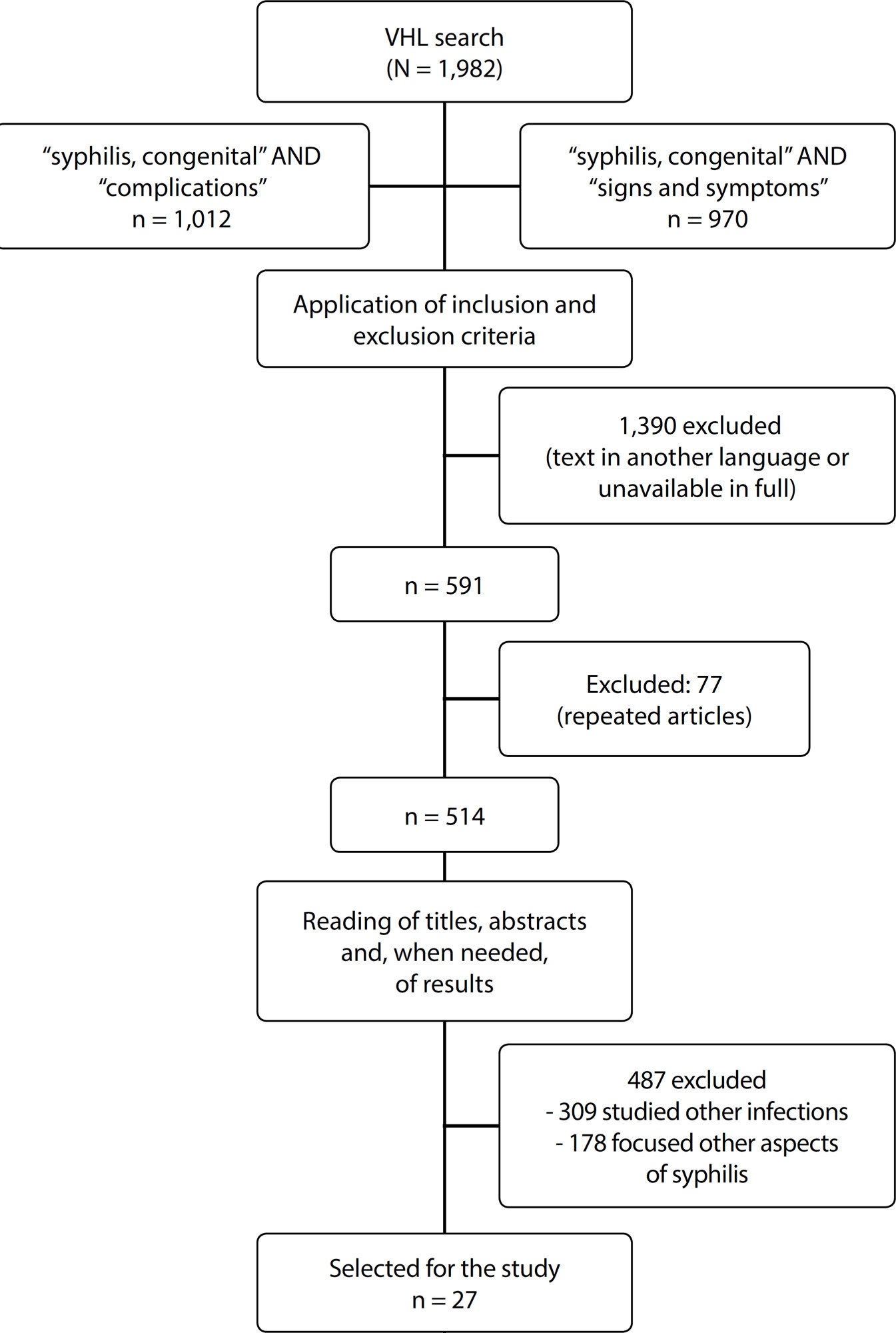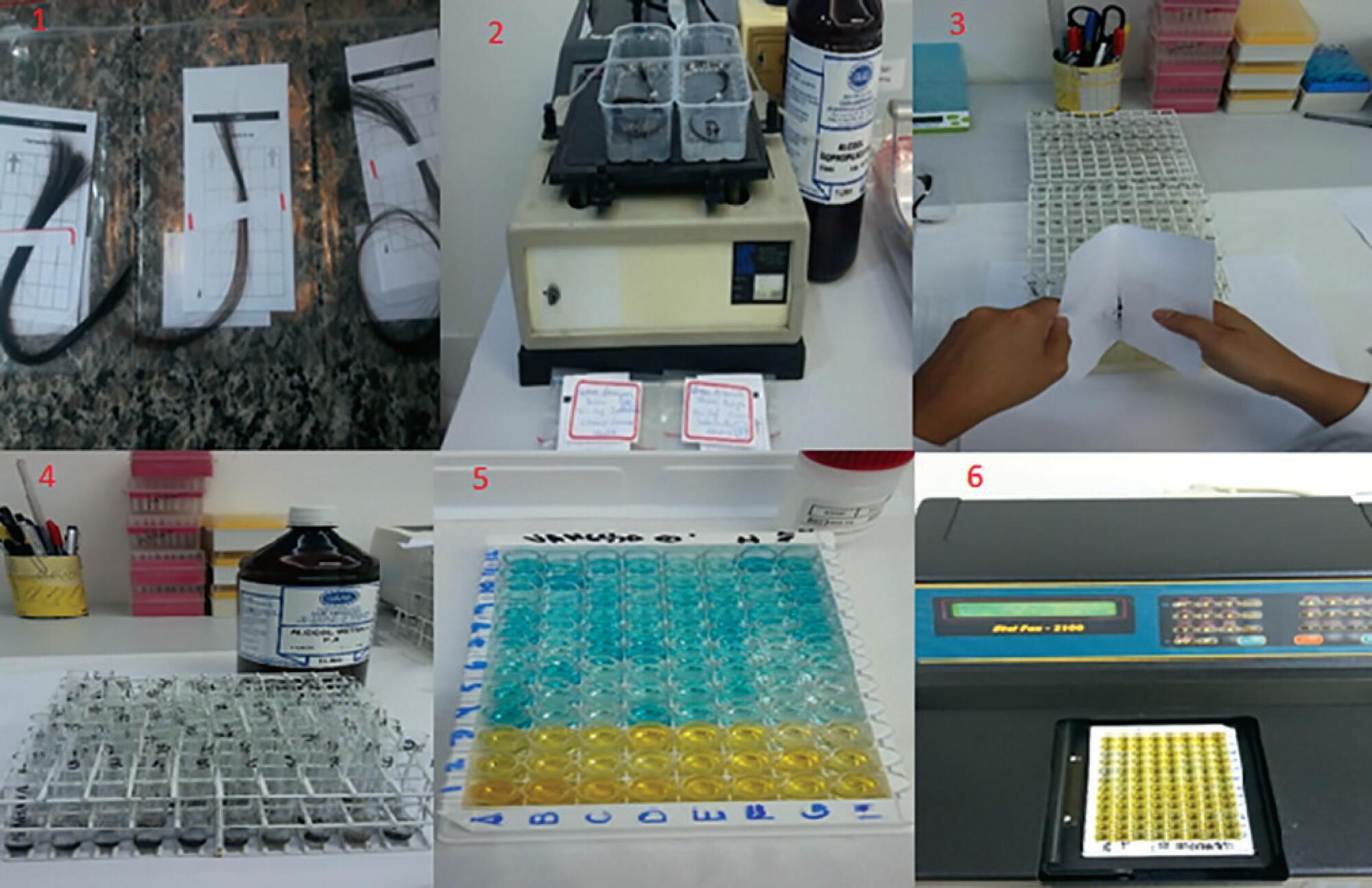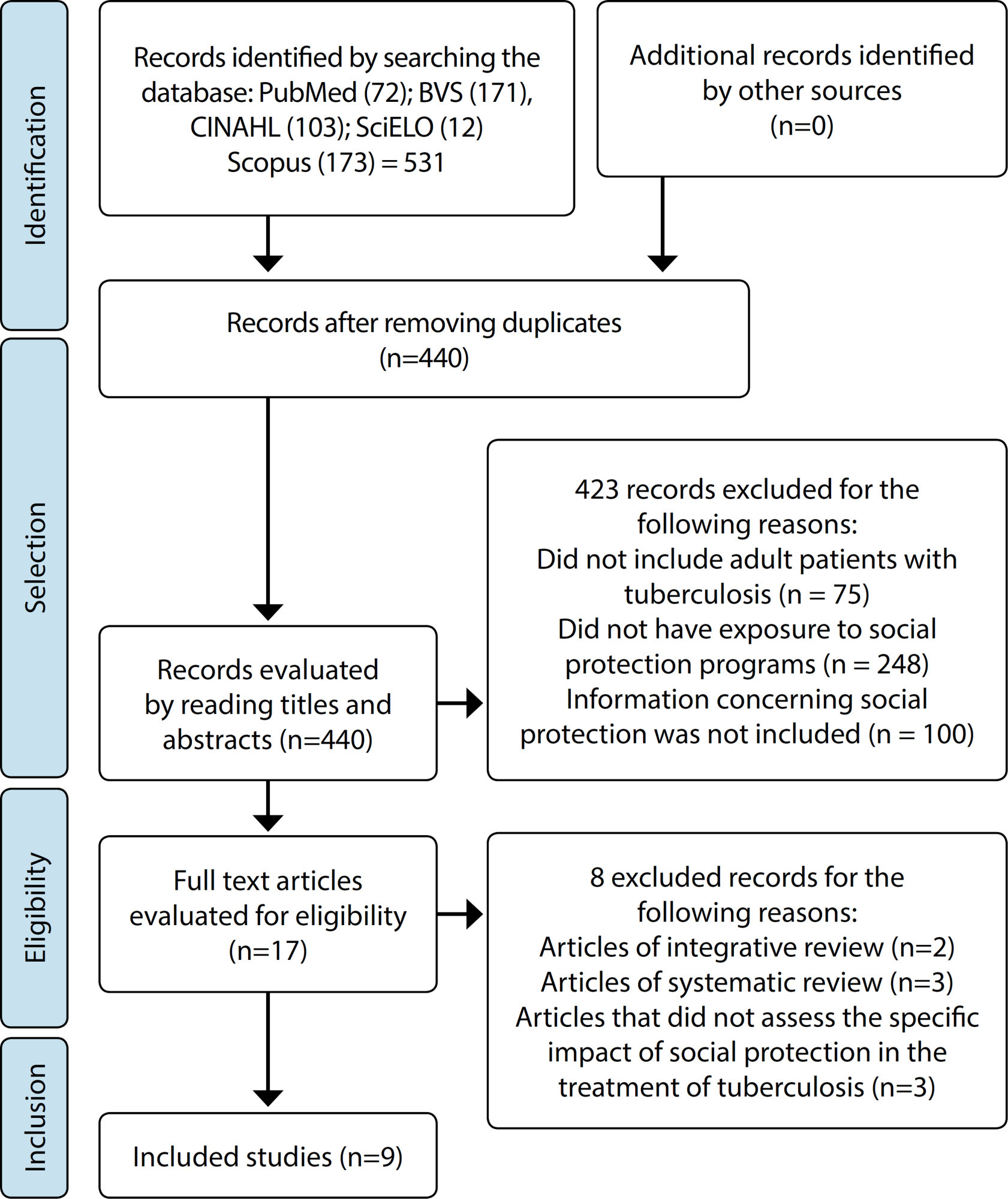-
RESEARCH
Body mass index, waist circumference, and arterial hypertension in students
Revista Brasileira de Enfermagem. 2015;68(2):214-218
01-01-2015
Abstract
RESEARCHBody mass index, waist circumference, and arterial hypertension in students
Revista Brasileira de Enfermagem. 2015;68(2):214-218
01-01-2015DOI 10.1590/0034-7167.2015680205i
Views0See moreABSTRACT
Objective:
to investigate what is the best anthropometric predictor of arterial hypertension among private school students.
Method:
this was a cross-sectional study with 286 students between the ages of 10 and 14 from two private schools in the city of Paranavaí, Paraná, Brazil. The following variables were analyzed: body mass index, waist circumference and blood pressure. Statistical analysis was conducted with Pearson’s partial correlation test and multivariate logistic regression, with p<0.05.
Results:
both anthropometric indicators displayed weak correlation with systolic and diastolic levels, with coeffi cients (r) ranging from 0.27 to 0.36 (p < 0.001). Multivariate analysis showed that the only anthropometric indicator associated with arterial hypertension was waist circumference (OR= 2.3; 95% CI: 1.1-4.5), regardless of age or gender.
Conclusion:
this age group, waist circumference appeared to be a better predictor for arterial hypertension than body mass index.
-
RESEARCH
Perception of primary healthcare management nurses on the nursing process
Revista Brasileira de Enfermagem. 2015;68(2):206-213
01-01-2015
Abstract
RESEARCHPerception of primary healthcare management nurses on the nursing process
Revista Brasileira de Enfermagem. 2015;68(2):206-213
01-01-2015DOI 10.1590/0034-7167.2015680204i
Views0See moreABSTRACT
Objective:
this qualitative study aimed to analyze the perceptions of primary health care management nurses on the nursing process.
Method:
data were collected through interviews and analyzed by the Content Analysis proposed by Bardin’s theoretical framework.
Results:
managers recognize the importance of the nursing process, although its implementation was not a priority at the time of the interviews. A conceptual diffi culty and a lack of understanding that the implementation of the care methodology should be a cross-departmental action in the local healthcare management were clearly observed.
Conclusion:
managers should have their perspectives broadened concerning the relevance of the nursing process and the professional training. The active participation of legislative nursing bodies, local healthcare management and the federal government may open the way for the effective implementation of the nursing process.
-
RESEARCH
Cross-cultural cultural adaptation of the “Nursing Students’ Attitudes Toward Mental Health Nursing and Consumers” in Brazil
Revista Brasileira de Enfermagem. 2015;68(2):198-205
01-01-2015
Abstract
RESEARCHCross-cultural cultural adaptation of the “Nursing Students’ Attitudes Toward Mental Health Nursing and Consumers” in Brazil
Revista Brasileira de Enfermagem. 2015;68(2):198-205
01-01-2015DOI 10.1590/0034-7167.2015680203i
Views0See moreABSTRACT
Objective:
to make across-cultural adaptation of the “Nursing Students’ Attitudes Toward Mental Health Nursing and Consumers” scale in Brazil.
Method:
the scale was tested regarding conceptual, item, semantic, and operational equivalence.
Results:
content validation was conducted by an expert committee with a minimum consensus level of 80%. This process resulted in a 35-item scale divided into 6 factors. The experts reached 100% consensus on the scale’s clarity of language, practical pertinence and theoretical relevance, as well as on the need for excluding one factor. Data were collected in 2013 in the city of Londrina, Paraná, Brazil.
Conclusion:
the instrument was cross-culturally adapted to Brazilian Portuguese and presented satisfactory content validity. We propose further studies on the scale’s psychometric properties, such as construct validity, internal consistency and reliability.
-
RESEARCH
Relational skills and preserving patient privacy in the caring process
Revista Brasileira de Enfermagem. 2015;68(2):191-197
01-01-2015
Abstract
RESEARCHRelational skills and preserving patient privacy in the caring process
Revista Brasileira de Enfermagem. 2015;68(2):191-197
01-01-2015DOI 10.1590/0034-7167.2015680202i
Views0See moreABSTRACT
Objective:
to analyze the development and mobilization of relational skills central to the caring process among nursing students throughout their professional training.
Method:
this was a quantitative study, descriptive and cross-sectional in design. The sample consisted of nursing undergraduate students from the Higher School of Health Sciences, in the city of Évora, Portugal. Data were collected using the previously validated Helping Relational Skills Inventory.
Results:
the students gradually acquired “generic skills”, “communication skills” and “contact skills”, presenting the highest mean score in the last year of the program. However, the highest mean score for the “empathetic skills” subscale was presented by second-year students.
Conclusion:
age and year in program were found to be decisive variables regarding the acquisition of specifi c skills (empathetic and communication) by nursing students.
-
EDITORIAL
A ABEn na defesa intransigente do SUS
Revista Brasileira de Enfermagem. 2015;68(2):185-186
01-01-2015
Abstract
EDITORIALA ABEn na defesa intransigente do SUS
Revista Brasileira de Enfermagem. 2015;68(2):185-186
01-01-2015DOI 10.1590/0034-7167.2015680201i
Views0Este título do Editorial de 2015 bem poderia ser de uma revista publicada em décadas passadas, período em que todas as entidades profissionais e a sociedade civil lutaram pela saúde como direito, como conquistado na Constituição de 1988. Vinte e cinco anos depois, com o Sistema Único de Saúde capilarizado por todo o país, mesmo […]See more -
EDITORIAL
The Brazilian Association of Nursing in the uncompromising defense of the Brazilian Unified Health System
Revista Brasileira de Enfermagem. 2015;68(2):185-186
01-01-2015
Abstract
EDITORIALThe Brazilian Association of Nursing in the uncompromising defense of the Brazilian Unified Health System
Revista Brasileira de Enfermagem. 2015;68(2):185-186
01-01-2015DOI 10.1590/0034-7167.2015680201i
Views0The title of the 2015 Editor’s Comments could very well be from a journal published in decades past, a time when, in Brazil, all professional entities and civil society fought for the right to health, as was later established in the Brazilian Constitution of 1988. Twenty-five years later, despite its financial limitations and restricted operational […]See more -
EXPERIENCE REPORT
Nursing diagnoses and interventions for a child after cardiac surgery in an intensive care unit
Revista Brasileira de Enfermagem. 2015;68(1):155-160
01-01-2015
Abstract
EXPERIENCE REPORTNursing diagnoses and interventions for a child after cardiac surgery in an intensive care unit
Revista Brasileira de Enfermagem. 2015;68(1):155-160
01-01-2015DOI 10.1590/0034-7167.2015680121i
Views0See moreObjetivo:
descrever o julgamento clínico de enfermagem para identificar diagnósticos NANDA e desenvolver um plano de tratamento NIC para uma criança em pós-operatório de cirurgia cardíaca em terapia intensiva.
Método:
estudo de caso com coleta de dados retrospectiva no prontuário.
Resultados:
três enfermeiras identificaram diagnósticos NANDA e intervenções NIC. Criança de 6 meses, submetida a cirurgia cardíaca, necessitou oxigenação extracorpórea por membrana no pós-operatório. Foram identificados quatro principais diagnósticos, aos quais foram direcionadas dez intervenções. A proposta de intervenções para responder às necessidades humanas prioritárias da criança foi otimizada pelo uso das terminologias padronizadas. Todos os diagnósticos foram sustentados por indicadores diagnósticos; todas as intervenções foram cientificamente sustentadas.
Conclusão:
espera-se que os enfermeiros abordem não somente as respostas fisiológicas, mas também aquelas dos domínios psicossociais.
-
REVIEW
Adverse events and safety in nursing care
Revista Brasileira de Enfermagem. 2015;68(1):144-154
01-01-2015
Abstract
REVIEWAdverse events and safety in nursing care
Revista Brasileira de Enfermagem. 2015;68(1):144-154
01-01-2015DOI 10.1590/0034-7167.2015680120i
Views0See moreObjective:
to identify the scientific publications about adverse events in nursing care in adult hospitalized patients and discuss the main adverse events in nursing care.
Method:
Integrative revision with a qualitative approach. The data were collected at LILACS, MEDLINE, BDENF and the library SCIELO and were submitted to thematic analysis.
Results:
three categories were developed: Adverse events in nursing care; The main causes of the adverse events in nursing care; Attitude of nursing professionals in face of errors. The main events were identified in nursing care with emphasis on the medication error, the failure to perform dressings and falls of patients. The importance of instruments was emphasized for notification of adverse events in the institutions. However the fear of punishment on professionals stimulates the underreporting of events.
Conclusion:
it is important to discuss effective prevention strategies that ensure patient safety in healthcare institutions.
-
REVIEW
Complications, clinical manifestations of congenital syphilis, and aspects related to its prevention: an integrative review
Revista Brasileira de Enfermagem. 2021;74(4):e20190318
07-14-2021
Abstract
REVIEWComplications, clinical manifestations of congenital syphilis, and aspects related to its prevention: an integrative review
Revista Brasileira de Enfermagem. 2021;74(4):e20190318
07-14-2021DOI 10.1590/0034-7167-2019-0318
Views0See moreABSTRACT
Objectives:
to identify the scientific evidence about the clinical complications and manifestations of congenital syphilis and aspects related to its prevention.
Methods:
integrative review after a search in the databases LILACS and MEDLINE, carried out in March 2018, using the descriptors “syphilis, congenital”, “complications”, and “signs and symptoms”, leading to the selection of 27 researches.
Results:
the publications found were published from 1966 to 2017, and most of them were from Latin America and Africa. Negative outcomes, laboratory changes, and the clinical manifestations in congenital syphilis, whether early or delayed, were, respectively: low weight at birth, anemia, hepatosplenomegaly, and dental alterations. The lack of treatment of the pregnant women in the prenatal was the most common occasion in which the opportunity to prevent the complications of congenital syphilis was lost.
Conclusions:
the scientific evidences analyzed showed serious complications of congenital syphilis that could be avoided if early opportunities of diagnosing and treating the pregnant women are not lost during the prenatal.

-
ORIGINAL ARTICLE
Cultural adaptation of Infant Feeding Intentions Scale (IFI) for pregnant women in Brazil
Revista Brasileira de Enfermagem. 2020;73:e20190103
07-15-2020
Abstract
ORIGINAL ARTICLECultural adaptation of Infant Feeding Intentions Scale (IFI) for pregnant women in Brazil
Revista Brasileira de Enfermagem. 2020;73:e20190103
07-15-2020DOI 10.1590/0034-7167-2019-0103
Views0See moreABSTRACT
Objectives:
to translate and culturally adapt the Infant Feeding Intentions Scale for pregnant women in Brazil.
Methods:
methodological study that included stages of translation, synthesis, face and content validation, back translation and semantic assessment. In the face and content and semantic validation stages, we used the Content Validity Index for individual items and for the overall scale for clarity and representativeness.
Results:
nine (100.0%) experts participated in face and content validation, and the average index obtained was 85.0% for representativeness. In the semantic assessment, performed with 31 (100.0%) pregnant women, the tool was considered clear, obtaining an average index of 91.0%.
Conclusions:
the Brazilian version of the scale was considered representative and clear. After assessing psychometric properties, the scale is expected to be valid and reliable to assess maternal intention to breastfeed exclusively until the infant’s six months of life in different Brazilian settings.
-
ORIGINAL ARTICLE
Development, validation and application of clinical simulation scenarios for assessment of stomatherapy specialists
Revista Brasileira de Enfermagem. 2021;74(1):e20200360
03-24-2021
Abstract
ORIGINAL ARTICLEDevelopment, validation and application of clinical simulation scenarios for assessment of stomatherapy specialists
Revista Brasileira de Enfermagem. 2021;74(1):e20200360
03-24-2021DOI 10.1590/0034-7167-2020-0360
Views0ABSTRACT
Objectives:
to build and validate three clinical simulation scenarios and report the application with candidates for the specialist’s degree in stomatherapy.
Methods:
methodological study, building three scenarios and evaluation checklists; content validation with judges, using content validity index and Modified Kappa Coefficient; pre-test and application.
Results:
scenarios built based on nursing care for: 1. insufficiency and venous ulcer; 2. demarcation of intestinal stomia; and 3. Clean intermittent catheterization. In the content validation of the 24 items appreciated, 83%, 80%, and 92% were validated without change. In the pre-test, the objectives and checklists were adjusted. In the application, to standardize the evaluation, actors and evaluators were trained previously, and each candidate passed the three stations.
Conclusions:
scenarios built and with validated content, based on evidence and covering the three areas of stomatherapy. The pre-test allowed for adjustments in the scenarios, and the candidates achieved the expected objectives.
Keywords:Educational AssessmentNursing EducationPatient SimulationSimulation TrainingValidation StudiesSee more -
ORIGINAL ARTICLE
Management of home care by family caregivers to elderly after hospital discharge
Revista Brasileira de Enfermagem. 2020;73:e20200474
12-07-2020
Abstract
ORIGINAL ARTICLEManagement of home care by family caregivers to elderly after hospital discharge
Revista Brasileira de Enfermagem. 2020;73:e20200474
12-07-2020DOI 10.1590/0034-7167-2020-0474
Views0See moreABSTRACT
Objective:
To understand the management of home care by family caregivers of dependent elderly people after hospital discharge.
Methods:
Qualitative research guided by hermeneutics-dialectic, anchored in the theory of communicative action. Data collection took place using a semi-structured interview with 11 participants.
Results:
Two categories were constructed: Management of the many types of care by the caregiver and the relationship between family caregiver and health care network. Care and management actions carried out routinely cause major changes in the family caregiver’s life. He/she does not recognize planning, home care periodicity or support in required procedures.
Final Considerations:
The management of home care for dependent elderly people after hospital discharge is complex, involving physical and emotional overloads, as well as difficulties in getting support from health services. The planning shared between the health team and the family since the discharge is required, and the better visibility of the role of primary care when the patient is assisted by a home care service.
-
Sexuality is associated with the quality of life of the elderly!
Revista Brasileira de Enfermagem. 2021;74:e20201272
07-09-2021
Abstract
Sexuality is associated with the quality of life of the elderly!
Revista Brasileira de Enfermagem. 2021;74:e20201272
07-09-2021DOI 10.1590/0034-7167-2020-1272
Views0See moreABSTRACT
Objective:
to analyze the association between sexuality and quality of life of Brazilian elderly residents in the community.
Methods:
a cross-sectional study conducted with 477 Brazilian elderly. The data were collected between August and October 2020. We used the EVASI and WHOQOL-OLD (World Health Organization Quality of Life). Data analysis was performed with Mann-Whitney, Spearman and Kruskal-Wallis correlation tests, with Bonferroni post-hoc application when necessary, considering a 95% confidence interval.
Results:
there was a statistical association between all dimensions of sexuality and the general quality of life of the elderly (p<0.05).
Conclusion:
the stimulation of sexuality can be configured as an innovative and holistic strategy focused on the promotion of health and active aging, since this study found the association between sexuality and the general quality of life of elderly people.
-
ORIGINAL ARTICLE
Stress and cortisol levels among members of the nursing team
Revista Brasileira de Enfermagem. 2020;73:e20180953
06-01-2020
Abstract
ORIGINAL ARTICLEStress and cortisol levels among members of the nursing team
Revista Brasileira de Enfermagem. 2020;73:e20180953
06-01-2020DOI 10.1590/0034-7167-2018-0953
Views0See moreABSTRACT
Objective:
To analyze the characteristics of hospital nursing professionals with the presence of stress, and to associate this with capillary cortisol.
Method:
A cross-sectional, exploratory and correlational study, conducted in a hospital in São Paulo, Brazil. A total of 164 nursing professionals participated; the Perceived Stress Scale was administered, and hair samples were obtained for laboratory analysis. Data were entered into a Microsoft Excel spreadsheet (2010), and then into Microsoft Office and the R software, version 3.2.2.
Results:
High levels of capillary cortisol in 47% of participants suggest the presence of stress, but no statistical significance between cortisol and stress levels were found.
Conclusions:
Stress and capillary cortisol levels were indicative of stress among nursing professionals; however, no association between them was found, although the values found were above those recommended.

-
ORIGINAL ARTICLE
Functional health literacy in hypertensive elders at primary health care
Revista Brasileira de Enfermagem. 2019;72:266-273
12-05-2019
Abstract
ORIGINAL ARTICLEFunctional health literacy in hypertensive elders at primary health care
Revista Brasileira de Enfermagem. 2019;72:266-273
12-05-2019DOI 10.1590/0034-7167-2018-0897
Views0See moreABSTRACT
Objective:
to assess the relationship between inadequate functional health literacy and inadequate blood pressure control in older people with hypertension in Primary Health Care.
Method:
a cross-sectional study with sample calculated at 392. SAHLPA-18 tool was used for functional health literacy; blood pressure was measured; sociodemographic and clinical data were collected. Hierarchical logistic regression was used.
Results:
(high) inadequate blood pressure and (low) functional inadequate health literacy were present in 41.6% and 54.6% of the people, respectively. Factors associated with inadequate blood pressure were: inadequate functional health literacy, black-brown skin color, overweight-obesity, hypertension diagnosis time, non-adherence to exercise/diet, drug treatment. Schooling had no association with inadequate blood pressure
Conclusion:
hypertensive elderly people with inadequate health literacy were more likely to have inadequate blood pressure. Thus, health professionals need to value functional health literacy as a possible component to control blood pressure.
Search
Search in:
Nuvem de Tags
Aged (144) Atenção Primária à Saúde (239) COVID-19 (104) Cuidados de Enfermagem (269) Educação em Enfermagem (151) Educação em Saúde (139) Enfermagem (930) Estudos de Validação (131) Health Education (144) Idoso (208) Mental Health (149) Nursing (987) Nursing Care (306) Patient Safety (151) Primary Health Care (284) Qualidade de Vida (104) Quality of Life (106) Saúde Mental (145) Segurança do Paciente (150) Validation Studies (108)




